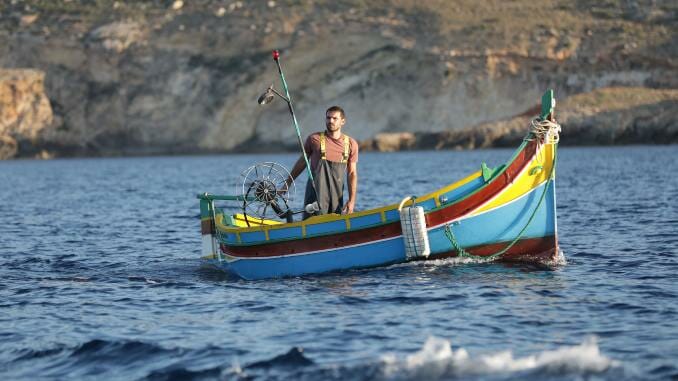The Luzzu May Be Sinking, But Alex Camilleri’s Wonderful Debut Stays Afloat

What a tragic fate, to live at the intersection where tradition crosses modernity. Post-Brexit, Americans and Europeans alike have grown to romanticize the EU despite its pronounced flaws; stamping each of its 27 countries with a uniform slate of regulations, as if economic accords come in “one size fits all” measurements, has had a negative impact on the working class. Without offering direct commentary on either rose-tinted liberal views or Boris Johnson’s nationalist maneuvering, Maltese-American writer/director/editor Alex Camilleri’s naturalist debut, Luzzu, dramatizes those blue-collar struggles under well-intended but neglectful political guidance. The film is about the EU without being about the EU.
It’s strictly about Jesmark Scicluna, a 20-something Maltese fisherman playing himself, to a point: Camilleri’s writing tailors Jesmark’s personal experiences into a character of similar background but with varied ordeals. Jesmark is the son of a fisherman who was himself the son of a fisherman and so on down the generations, with each father passing down the family luzzu—the vivid red-yellow-blue fishing boat traditionally used by sailors of the Maltese islands. Wishing to make his living the same way his forebears did, Jesmark collides with roadblocks and other obstacles, primarily financial and also domestic. He has an infant son with his girlfriend, Denise (Michela Farrugia), and they’re told by their pediatrician that the little cutie has a growth impediment solved only by expensive medical intervention.
This is the last thing young parents want to hear, especially young parents on the edge of financial instability. The last thing that Jesmark specifically wants to hear is any kind of hemming or hawing over his dogged determination to fish like his dad. It’s all he knows…at least that’s what he tells himself, Denise and David (David Scicluna, the real Jesmark’s cousin), his mentor and his father’s old pal. Grant that fishing is in Jesmark’s DNA. But also grant that Jesmark’s world is evolving and changing around him. He can change with it, or he can dig in his heels. Jesmark runs into fellow fisherman Kevin (Yuric Allison), who tells him he decommissioned his boat for an EU payout. Instead of wearing raggedy-ass T-shirts, Kevin now wears chic button-ups and leather boots.
-

-

-

-

-

-

-

-

-

-

-

-

-

-

-

-

-

-

-

-

-

-

-

-

-

-

-

-

-

-

-

-

-

-

-

-

-

-

-

-








































